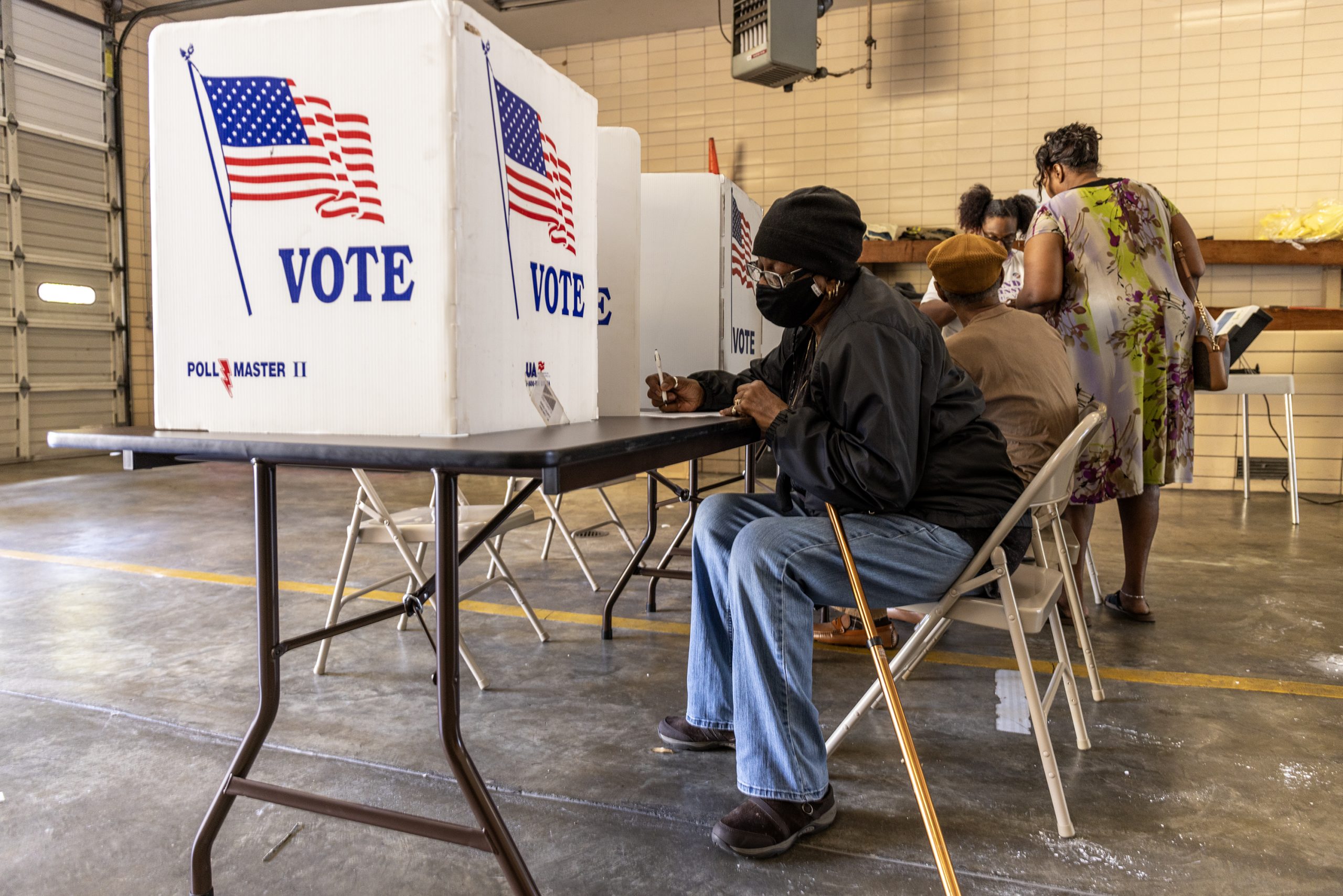Mississippi Today
How to watch the Mississippi governor’s race results like a political pro

Mississippians cast their votes Tuesday in the contentious governor’s race between Gov. Tate Reeves and Democratic challenger Brandon Presley.
Independent candidate Gwendolyn Gray, who dropped out of the race in early October, withdrew too late to be removed from the ballot. Her candidacy could force the first gubernatorial runoff in the state’s history.
Mississippi Today’s political team compiled key themes to watch tonight as the results come in.
LIVE RESULTS: Mississippi’s general election 2023
Will there be a runoff?
Pre-election polling from both Democrats and Republicans showed Reeves right at or just under earning 50% of the vote. If Gray, the independent candidate, earned enough of a protest vote on Tuesday, the top two vote-getters will face each other in a Nov. 28 runoff election.
The number to watch here is between 3% and 4%. One Republican consultant shared with Mississippi Today that they believe if Gray gets at least 3% of the overall statewide vote, it could be enough to keep Reeves or Presley under 50% and force a runoff. A second Republican consultant said it may take 4% support for Gray to force a runoff.
In 2019, there were two third-party candidates who ran against Reeves, the Republican nominee, and Jim Hood, the Democratic nominee. Together, those two third-party candidates only garnered 1.3% of the overall vote.
Did Reeves get enough conservative support?
Reeves this cycle notably struggled with firing up voters of the Republican Party’s most conservative wing.
If counties that are considered conservative strongholds turn out in numbers equal to or better than 2019, this could be a sign that Reeves has weathered struggles with GOP voter enthusiasm.
Jones County, considered by many the state’s capital of the far-right conservative movement, is a bellwether here. In 2019, Reeves earned 13,784 votes in Jones County — 65% of the county’s total 21,257 residents who cast ballots. If Reeves gets anything less than 13,784 votes today, that could be a sign of lower-than-needed conservative support.
Pearl River County, another strongly conservative locale, is another to watch. In 2019, Reeves earned 10,083 votes here — 77% of the county’s total 13,151 residents who cast ballots. It looks like 10,000 is the magic number for Reeves here, and anything less could show broader problems among Mississippi conservatives.
Did Presley get enough Black voter support?
Presley, if he has any chance of winning or forcing Reeves to a runoff, needs high levels of Black voter support. He has spent 2023 earnestly trying to earn that support, and numerous Black local elected officials have served as his surrogate for months.
Hinds County, of course, is the most critical county in this regard. It’s the most populous county in the state, and it’s 69% Black. In 2019, Hood, the Democrat, beat Reeves here by 56 points (78% to 22%). Hood beat Reeves in Hinds County by 40,527 votes — by far the largest head-to-head defeat in that election.
If Presley has upped that Hinds County margin of victory today, that could be enough to vault the Democrat’s campaign.
Of major note in Hinds County tonight: There were reports of at least nine precincts across the county that ran out of ballots at various points during the day. Multiple lawsuits were filed attempting to extend precinct hours, and less than an hour before the schedule 7 p.m. polling close time, a chancery judge extended the hours at some precincts.
The Gulf Coast battleground
The populous three counties of the Gulf Coast, by many accounts, secured Reeves’ victory in 2019 as he ran up a more than 22,400 vote margin over Hood. Reeves’ margin of victory in those three counties was about half of his overall margin of victory statewide.
Reeves topped Hood by 18 points in the second-most populous Harrison County. The Coast is a Republican stronghold, but even by that measure Hood performed poorly in turning out Coast Democrats.
Presley and his campaign have worked hard on the Coast, and focused on turning out Black voters in North Gulfport and Turkey Creek in Harrison County, Moss Point in Jackson County, and other relatively large Democratic areas.
Presley stands little chance of winning the Republican-majority Coast, but if he can substantially reduce Reeves’ margin there he can remain competitive statewide.
How do suburban voters swing?
Presley’s campaign has also targeted voters in suburban counties that typically vote Republican but have trended more toward Democrats in recent years.
In 2019, Reeves shellacked Hood by 23 points — or nearly 8,600 votes — in the state’s third-most populous DeSoto County. While DeSoto remains strongly Republican leaning, its growing population has shifted to include a larger Black voting age population more likely to vote Democratic. Plus, Presley has performed well there in his district runs for Public Service Commissioner, and his campaign this cycle has focused much effort, including a get-out-the-vote ground game, in DeSoto County. It’s highly unlikely Presley could win DeSoto, but cutting losses drastically compared to those Hood suffered there would be something of a victory in an area where Reeves ran up his margin four years ago.
Rankin County, Reeves’ home county and the largest suburban county in the Jackson metro, is another one to watch. In 2019, Reeves won 29,861 votes in Rankin County — 64% of the county’s total 46,654 residents who cast ballots. Presley likely has no hopes of flipping this county, but watch for a smaller Reeves margin of victory in Rankin County. If the margin is less than 16,793 votes, that could be a sign that Presley’s strategy to appeal to moderates worked some.
Staying in the Jackson metro area, don’t forget about Madison County, which was a bright spot for Democrats in 2019. Hood garnered 19,670 votes or 50.4% to become the first Democrat since 1987 to win Madison County. Reeves won 48.7% of the vote in 2019. If Presley expects to win or force a runoff, he needs to at least match Hood’s performance from 2019.
Presley’s northeast Mississippi home
Another county to watch closely that could signal suburban voter support: Lee County in northeast Mississippi.
In the early 2000s, Presley served as mayor of Nettleton, which is situated on the Lee County/Monroe County line. To be successful, Presley needs to do much better in his backyard of Lee County, the most populous county in the area, than Hood did in 2019. Even though Hood is from Chickasaw County, which is contiguous to Lee, he was still swamped by Reeves in Lee County four years ago. In 2019, Reeves captured 14,672 votes or 58.3% in Lee to 10,293 or 40.9% for Hood.
Presley might not need to win Lee County to win or force a runoff, but he needs to do much better than Hood did in 2019. Needless to say, Presley needs to outperform Hood’s 2019 effort throughout northeast Mississippi.
This article first appeared on Mississippi Today and is republished here under a Creative Commons license.
Mississippi Today
On this day in 1977
On this day in 1977
March 8, 1977

Henry L. Marsh III became the first Black mayor of the former capital of the Confederacy, Richmond, Virginia.
Growing up in Virginia, he attended a one-room school that had seven grades and one teacher. Afterward, he went to Richmond, where he became vice president of the senior class at Maggie L. Walker High School and president of the student NAACP branch.
When Virginia lawmakers debated whether to adopt “massive resistance,” he testified against that plan and later won a scholarship for Howard University School of Law. He decided to become a lawyer to “help make positive change happen.” After graduating, he helped win thousands of workers their class-actions cases and helped others succeed in fighting segregation cases.
“We were constantly fighting against race prejudice,” he recalled. “For instance, in the case of Franklin v. Giles County, a local official fired all of the black public school teachers. We sued and got the (that) decision overruled.”
In 1966, he was elected to the Richmond City Council and later became the city’s first Black mayor for five years. He inherited a landlocked city that had lost 40% of its retail revenues in three years, comparing it to “taking a wounded man, tying his hands behind his back, planting his feet in concrete and throwing him in the water and saying, ‘OK, let’s see you survive.’”
In the end, he led the city from “acute racial polarization towards a more civil society.” He served as president of the National Black Caucus of Elected Officials and as a member of the board of directors of the National League of Cities.
As an education supporter, he formed the Support Committee for Excellence in the Public Schools. He also hosts the city’s Annual Juneteenth Celebration. The courthouse where he practiced now bears his name and so does an elementary school.
Marsh also worked to bridge the city’s racial divide, creating what is now known as Venture Richmond. He was often quoted as saying, “It doesn’t impress me to say that something has never been done before, because everything that is done for the first time had never been done before.”
He died on Jan. 23, 2025, at the age of 91.
This article first appeared on Mississippi Today and is republished here under a Creative Commons license.![]()
Mississippi Today
Judge tosses evidence tampering against Tim Herrington

A Lafayette County circuit judge ended an attempt to prosecute Sheldon Timothy Herrington Jr., the son of a prominent north Mississippi church family who is accused of killing a fellow University of Mississippi student named Jimmie “Jay” Lee, for evidence tampering.
In a March 7 order, Kelly Luther wrote that Herrington cannot be charged with evidence tampering because of the crime’s two-year statute of limitations. A grand jury indicted the University of Mississippi graduate last month on the charge for allegedly hiding Lee’s remains in a well-known dumping ground about 20 minutes from Herrington’s parent’s house in Grenada.
“The Court finds that prosecution for the charge of Tampering with Physical Evidence commenced outside the two-year statute of limitations and is therefore time-barred,” Luther wrote.
In order to stick, Luther essentially ruled that the prosecution should have brought the charges against Herrington sooner. In court last week, the prosecution argued that it could not have brought those charges to a grand jury without Lee’s remains, which provided the evidence that evidence tampering occurred.
The dismissal came after Herrington’s new counsel, Jackson-area criminal defense attorney Aafram Sellers, filed a motion to throw out the count. Sellers did not respond to a request for commend by press time.
This article first appeared on Mississippi Today and is republished here under a Creative Commons license.![]()
Mississippi Today
JXN Water is running out of operating money, set to raise rates again

JXN Water is losing money at a rate it can’t sustain, according to a financial outlook it released last week, as the federal dollars it received to run day-to-day operations are set to run out next month.
Ted Henifin, who manages the third-party provider, told Mississippi Today on Thursday that the funding shortfall may extend repair times for line breaks, and that the utility will look to once again raise rates on customers’ water bills. Henifin explained that various factors — such as debt payments, higher-than-expected operating costs, and slower-than-expected collections gains — have left the water utility in a precarious position where it’s now losing $3 million a month.
“Gone from a water disaster to a bit of financial disaster or so,” Henifin described.

The federal government set aside a historic $800 million for Jackson to fix its water and sewer systems in 2022, with $600 million of that tied specifically to the water system. That included $150 million of “flexible” funding, which JXN Water has used mostly for line repairs as well as on a contract with Jacobs to run the day-to-day operations of the system. The rest of the $600 million was intended for bigger, capital projects.
But the $150 million, Henifin said, is on track to run out in April. He said JXN Water will look for grants and low-interest loans to hold its operations together, as well as work with Congress to free up some of the $450 million — the amount intended for larger projects — for operations spending.
The water provider is also set to impose an almost 12% rate increase on customers’ water bills this spring — just under $9 per month for the average resident — the second rate hike in as many years (the utility a year ago raised rates on average $10 per month). While the 2022 federal order requires it to put rate increases before the Jackson City Council, JXN Water only needs the approval of overseeing U.S. District Judge Henry Wingate.

In addition to higher-than-expected operating costs, such as fixing line breaks, Henifin said the utility was also unsuccessful in retiring some of the city’s debt due to federal constraints over how it spends the $450 million pot. As a result, JXN Water is paying $1.5 million a month, or half of its total losses, in debt services.
Meanwhile, the utility’s revenue collection rate of 70% is an improvement from a year ago, when it was under 60%, but it’s still far below the national average. Last year, Henifin told Mississippi Today in order to make the water system self-sustainable by the time federal funding runs out, the rate needs to reach 80% in 2025 and 90% in 2026. The financial report says there are 14,000 accounts that receive water but aren’t paying bills.
Henifin admitted on Thursday, though, that even if collection rates were at 100%, JXN Water would still be losing money.
“It’s really the running out of the federal funds and not having closed that gap on local revenues,” he said. “Error on our part maybe that we didn’t focus on this earlier, but we were really trying to get the water system working.”
Last week’s financial plan added that a decision from the 5th U.S. Circuit Court of Appeals over whether to release SNAP recipient data is expected within the next two months. JXN Water last year introduced a first-of-its-kind discount for SNAP recipients, but both federal and state officials appealed an order from Wingate to release the names of those recipients, preventing the utility from automatically applying those discounts.

To help free up funding for the utility, Rep. Chris Bell, D-Jackson, wrote a bill which would allow JXN Water to become a water authority for the purpose of accessing tax-exempt bonds or loans. The bill now just needs to pass a floor vote in the Senate.
Henifin added that, after some initial uncertainty, JXN Water’s current funding won’t be impacted by the Trump administration’s recent freezing of federal grant funds.
He also said the funds they do have access to are being used to make major improvements, such as fixing the membrane trains, filters and sediment basins at the O.B. Curtis treatment plant.
“I think it’s a pretty bright future,” Henifin said. “If we can just get over this little cashflow hump we’re in good shape.”
This article first appeared on Mississippi Today and is republished here under a Creative Commons license.![]()
-

 News from the South - Louisiana News Feed3 days ago
News from the South - Louisiana News Feed3 days agoRemarkable Woman 2024: What Dawn Bradley-Fletcher has been up to over the year
-

 News from the South - Florida News Feed7 days ago
News from the South - Florida News Feed7 days ago4 killed, 1 hurt in crash after car attempts to overtake another in Orange County, troopers say
-

 Mississippi Today7 days ago
Mississippi Today7 days agoJudge’s ruling gives Legislature permission to meet behind closed doors
-

 News from the South - Oklahoma News Feed2 days ago
News from the South - Oklahoma News Feed2 days agoMarch 6,2025: Rain and snow on the way
-

 News from the South - Virginia News Feed6 days ago
News from the South - Virginia News Feed6 days agoProbation ends in termination for Va. FEMA worker caught in mass layoffs
-

 News from the South - Texas News Feed3 days ago
News from the South - Texas News Feed3 days agoTravis County DA failed to meet deadline to indict murder suspect | FOX 7 Austin
-

 News from the South - Texas News Feed7 days ago
News from the South - Texas News Feed7 days agoWorld leaders react to Trump, Zelensky dispute
-

 News from the South - North Carolina News Feed5 days ago
News from the South - North Carolina News Feed5 days agoConfederate monument in Edenton will remain in place for now
















































